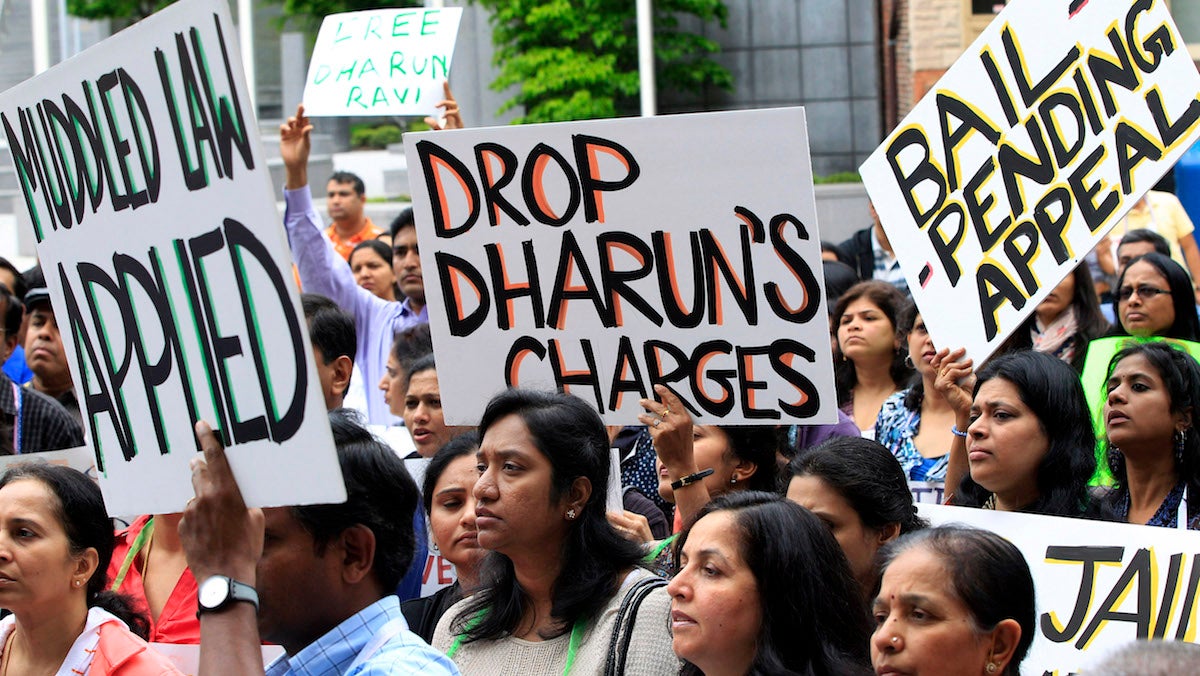N.J. court overturns conviction in Rutgers roommate spying case

Several hundred supporters rally in front of the New Jersey Statehouse in Trenton in 2012 on behalf of Dharun Ravi
The former Rutgers student who was found guilty of spying on an intimate encounter between his roommate and another man has had his convictions overturned.
A New Jersey appeals court panel threw out the convictions of bias intimidation against Dharun Ravi, citing a 2015 state Supreme Court decision nullifying part of the law used to convict him.
Tyler Clementi, Ravi’s roommate, committed suicide in 2010 after he discovered Ravi had taped Clementi and invited friends to watch.
Convicted in 2012 of bias intimidation, invasion of privacy and tampering with evidence, Ravi was sentenced to 30 days in a county jail, three years of probation and 300 hours of community service.
“The sense of loss associated with a young man taking his own life defies our meager powers of reason and tests our resolve to seek consolation,” wrote Superior Court Judge Jose Fuentes in the decision. “From a societal perspective, this case has exposed some of the latent dangers concealed by the seemingly magical powers of the internet.”
For years New Jersey had a bias intimidation law that hinged on whether the victim felt that he or she was targeted for a specific reason, such as race, religion, or sexual orientation. It didn’t matter if the perpetrator targeted the victim for that reason — only that the victim felt that way.
In 2015, the state Supreme Court nullified that section of the law.
Attorney Lawrence S. Lustberg argued that case in 2015 and represented Ravi in his appeal.
“There are statutes that turn on what happens to the victim, like how badly hurt they are, for example. But to have a crime that turns entirely on the perception of the victim is pretty much unprecedented,” said Lustberg.
Lustberg said he expects to see other convictions that were won using the bias intimidation law challenged in the future.
In its ruling on Friday, the appeals court panel also threw out all but one of the other charges against Ravi because it said the jury was unfairly influenced by the evidence used to prove bias intimidation, which has now been deemed unconstitutional.
“At the Ravi trial, there was all kinds of evidence that came in as to the effect of the events that transpired on the state of mind of Tyler Clementi, the victim, how what happened made him feel intimidated and humiliated,” said John Kip Cornwell, a law professor at Seton Hall University.
The remaining count, hindering apprehension in the second degree, was overturned due to a lack of evidence.
It is unclear how many convictions have been won using the state’s now-nullified bias intimidation law, because New Jersey does track convictions by statute, according to a spokesman for the New Jersey Courts.
The Middlesex County prosecutor did not immediately return a message asking whether the office would seek a new trial against Ravi on the other charges.
WHYY is your source for fact-based, in-depth journalism and information. As a nonprofit organization, we rely on financial support from readers like you. Please give today.




